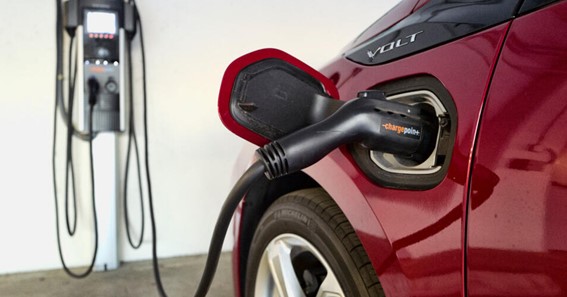Reports by the Society of Motor Manufacturers and Traders (SMMT) showed a remarkable increase in the number of electric vehicles sold in the UK in December 2022. For the first time in years, EV’s monthly share of the car market in the UK reached 32.9%, which is higher than the numbers for hybrid and diesel vehicles. Petrol sales, however, are still higher at 42.3%.
Insiders believe that the increase can be attributed, in a large part, to the new models of Tesla EVs shipped towards the latter part of 2022. Tesla’s Model Y crossover topped the sales charts after more than 10,600 units of the electric vehicle were sold. The Model 3 saloon was second in line with total sales of a little over 5,700 units.
In the overall UK sales charts last year, the Tesla Model Y managed to sneak into third place with its total 2022 sales at 35,551. The EV sold more units than the Vauxhall Corsa, Nissan Qashqai, and Ford Puma. Along with the Kia Nero EV and Tesla’s Model 3, Model Y is one of the bestselling EVs in 2022.
Most of the car purchases last year were fleet and business sales. They accounted for 66.7% of the total BEV or battery-electric vehicle buyers for 2022. This is a clear indication that companies understand and value BEVs, particularly if you consider the Benefit-in-Kind tax rate of 2%.
If you look at 2021 and 2022 EV sales, you’ll find that last year’s numbers were higher by at least 40.1%, the highest yet for battery-electric vehicles in the UK.
Post-pandemic, vehicle sales are still quite slow, but a significant improvement is expected this year, 2023. SMMT Chief Executive Mike Hawes suggested that governments persuade car owners to switch to electric vehicles and for businesses to ensure the rapid development of charging infrastructure nationwide.
Thousands of EV sales are not enough to help the country move forward to its zero-emissions goal. Car sales should be side-by-side with investments and strict policies so consumers will see that switching to the better, cleaner, and safer alternative is the best option for them.
Government actions that do not help
While the government is actively campaigning for more car owners to choose electric over petrol or diesel, they are also the ones creating actions that can discourage the driving public.
One example of this is the plan to introduce a VED or Vehicle Excise Duty or road tax for battery-electric vehicles beginning in the year 2021. The idea is to identify a premium threshold similar to that of internal combustion vehicles – which penalises car owners planning to shift to driving EVs.
The erratic supply chain and high production costs are also major hindrances on the road to eliminating petrol and diesel vehicles by switching to EVs/BEVs. Governments should find ways to encourage, not discourage, car owners to choose the safer alternative.
Why diesel vehicles are bad
Diesel vehicles used to be the preferred option of most carmakers, car owners, and automotive industry authorities. The 2015 Dieselgate diesel emissions scandal changed everything.
In September of that year, US authorities sent a notice of violation to the Volkswagen Group after they discovered defeat devices installed in VW and Audi diesel vehicles sold to American consumers. These devices are programmed to detect when a vehicle gets into the lab for regulatory testing so they could manipulate and lower emissions levels to the World Health Organization’s safe and legal limits.
So, during testing, the vehicle appears clean, safe, emissions-compliant, and ready to be sold and driven. However, once the vehicle is out of the lab and driven on real roads, the vehicle releases excessively high volumes of nitrogen oxide or NOx emissions, a gas with life-threatening health and environmental impacts.
Volkswagen had to recall all the affected vehicles are ordered by US authorities. Over the years, the carmaker has also spent billions in paying off fines, settlement fees, and compensation for affected drivers.
Other carmakers are also involved in the scandal, including BMW, Mercedes-Benz, Renault, and Vauxhall.
These makers, according to authorities, violated emissions regulations and must be held responsible for their actions.
Click here – What You Can Do When Your Emergency Fund Is Running Low
Emission claim compensation
NOx emissions cause numerous health and environmental problems.
If you are exposed to NOx emissions, your mental health can be triggered, and episodes of anxiety and depression will be more frequent. As your cognitive abilities are weakened by NOx, dementia can set it.
Smog, acid rain, and ground-level ozone are all produced by NOx and exposure to these elements will make you more vulnerable to respiratory diseases, asthma, and lung problems, and your lungs can become weak and unable to function right. The most devastating impacts, however, are cancer, cardiovascular diseases, and premature death.
All the impacts mentioned above, along with your carmaker’s claims about your vehicle’s real emissions, are grounds for an emission claim. You have the right to claim compensation for every inconvenience the defeat device has caused you.
How should I begin my diesel claim?
The claims process can be tedious but working with an emissions expert can greatly help. You’ll also want to visit ClaimExperts so you can verify your eligibility to claim. You can only proceed with your claims case after you get all the information you need from them. Visit them now so you can start your claim.
Visit their site by clicking here.






